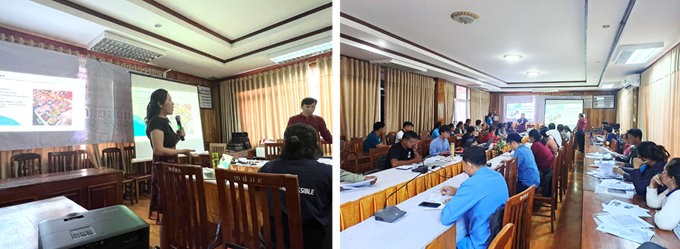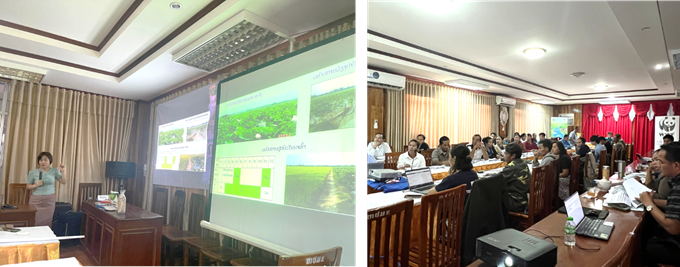One of the activities of the Microbiology and Food Safety research group is to strengthen connections and cooperation with domestic and international organizations.
From July 28 to August 3, 2024, the working group including Ass. Prof. Nguyen Thi Thanh Thuy and Dr. Vu Quynh Huong went on a business trip to connect and share the group's capabilities with Lao organizations in Siphandone. This area, known for its 4,000 islands, represents an important ecosystem of the Mekong River and the largest source of fish in Laos.
In the face of increasing climate change, preserving ecosystems and ensuring food safety are major challenges. The Lao government and international organizations such as ADB and WWF have implemented strategies to protect the area and diversify the livelihoods of local people.
The delegation visited and worked with the WWF organization in the Siphandone area of Champasak province, the Farmers' Association, the provincial Women's Union, representatives of the People's Committee of Kong district, and fish processing households in Don Khone and Hangsadam village.
At the conference, the group presented to 40 participants two topics including (1) Methods of preserving and processing fish; Methods to ensure food safety and hygiene in the fish production and processing chain; (2) Methods and solutions for developing lotus adapt to climate change; The use of all parts of the lotus in the fields of food, medicine, spirituality, industrial products, and eco-tourism is especially emphasized.
In addition, the group also introduced the Lotus Research and Development Center of the Vietnam National University of Agriculture, which has collected and preserved nearly 200 lotus varieties. These varieties have unique characteristics in morphology, physiology, and care conditions, allowing Lao people to choose varieties suitable to local conditions, helping to improve their livelihoods and diversify agricultural products.
Discussion activities at the hall took place enthusiastically for two days with many detailed exchanges. The field trip also helped the lecturers better understand the current situation and sanitary conditions at fish processing facilities in Lao, thereby making specific recommendations for improvement. Besides, local leaders also carefully arrange practical activities taking place in one day in different island villages where fish processing activities take place.
The general assessment during the field survey, while not not representative of all processing facilities, found that processing households have poor sanitary conditions. The processing area is in the lower part of the house with stagnant water, mud, dirt, and grass on the floor. The ceiling is dusty and moldy with free-range poultry, flies, and bugs around. The processing equipment is rudimentary, mainly storing fermented fish in plastic bags, and then placing them in empty painted plastic barrels. People handling fish and transferring fermented fish to other containers do not use protective gloves, wear cloth bracelets on their wrists, and immerse their hands in deep fish and fish juice.
Each step in the implementation process is carefully observed, then analyzed and discussed with local people about each cause, possible consequences, and remedies so they can gradually improve the process, and enhance hygiene throughout the chain, helping to ensure product quality and safety.
The Siphandone region has great potential for agricultural development and fresh fish processing that needs to be exploited sustainably. Applying ecosystem-based adaptation (EbA) solutions and diversifying products processed from lotus not only increases people's income but also attracts tourists, creating a base for developing models for many other areas.
In many areas in Laos, resources such as land, water, crops, livestock, and processed products have not been well exploited, and food safety issues have not received deep attention. Therefore, localities need to have strategies and action plans to use these resources well and sustainably, contributing to improving people's livelihoods and income.
The field trip helped the group's lecturers gain more practical experience, strengthen connections with international organizations and local authorities in several locations in the Siphandone region, and understand the current situation and needs of the people here for consulting and contributing ideas to the development of appropriate local policies.
Photos of activities in Siphandone, Lao
    |
 |
| Dr. Vu Quynh Huong, Faculty of Food Science Technology presents on the topic of processing, preserving, and ensuring hygiene during fish processing |
    |
 |
| Assoc. Prof. Nguyen Thi Thanh Thuy, Faculty of Food Science and Technology presents on the topic of methods and solutions for developing lotus to adapt to climate change and processing products from parts of the lotus. |
    |
 |
| VNUA’s lecturer guidance and advice on fish processing to ensure food safety in Don Khone village, Laos |
Microorganisms and Food Safety Research Group